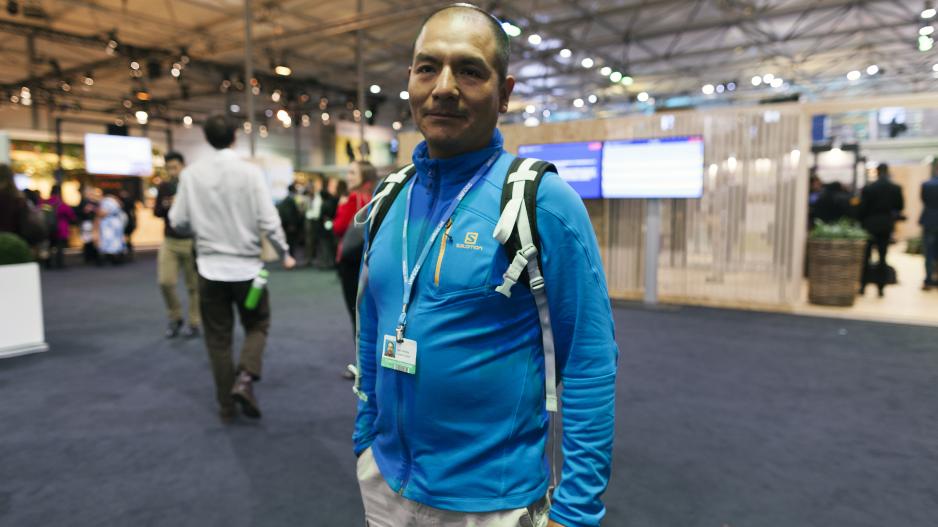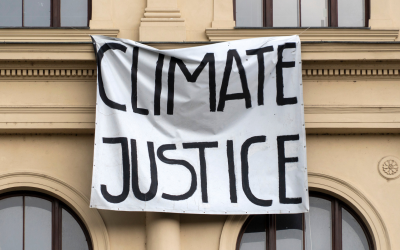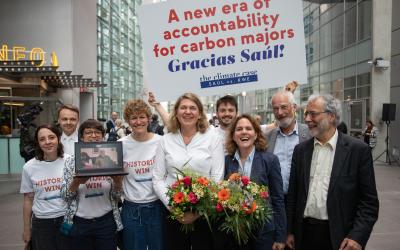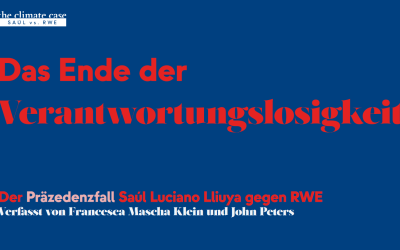

International climate politics
Countless people, especially in the Global South, are already suffering from the consequences of the climate crisis. Floods, forest fires and droughts are causing more and more climate-related damage and losses. People like Saúl Luciano Lliuya demand that those who caused climate change take responsibility for the consequences (polluter pays principle).
This responsibility is reflected, among other things, in the obligation of industrialized countries to provide international climate finance for climate-related loss and damage. This is an important and controversial topic at the international UN climate negotiations.
What does "Loss & Damage" mean?
Climate related Loss & Damage (L&D) includes the consequences of climate change to which individuals, communities, or countries cannot (or can no longer) adapt. They occur as a result of more frequent and intense extreme weather events, such as storms or floods, and slow-moving environmental changes, such as sea-level rise or glacier melt.
Countries in the Global South are particularly affected, although they have contributed least to the climate crisis. At the same time, they lack the (financial) capacity to adapt to the changes. Strategies to avoid, minimize and manage damage and losses are urgently needed, for example in the Peruvian Andean city of Huaraz, where a lake above the city has grown due to glacial melt. To avert the danger permanently, the construction of a larger protective dam and a new drainage system is urgently needed.
Countries with high historical and current emissions should provide (financial) support for dealing with losses and damages, in line with the polluter pays principle. Fossil fuel companies, such as RWE, should also share the costs of risks and damages they cause with their business model. Saúl Luciano Lliuya's lawsuit and his participation in world climate summits in the past have been important to push this debate.
UN Secretary-General Antonio Guterres called in a speech to the UN General Assembly in September 2022 for a tax on the enormous excess profits of the fossil fuel industry. Polluters should finally have to pay for the damage.
At the last climate conference in Egypt (COP27), dealing with Loss & Damage was finally put on the agenda as a key issue, and the establishment of a Loss & Damage fund and a support architecture beyond it was agreed. This is a major diplomatic breakthrough, in which climate lawsuits such as the RWE case played an important role.
Saúl Luciano Lliuya at COP27

Saúl Luciano Lliuya in a conference room at the International Climate Change Conference.
Plaintiff Saúl Luciano Lliuya participated in last year's COP27 in Egypt. He was able to use this opportunity to exchange with other people affected by climate change from all over the world and to increase the pressure on state and government representatives to finally implement an adequate solution for dealing with Loss & Damage so that people like him are protected from the risks and consequences of the climate crisis. He has spoken about his climate lawsuit at several events. You can find the recordings of the events here: To the events
For more information about COP27, please visit the Germanwatch Website.
Information on the topic of loss and damage can be found here:
The significance of climate litigation for the political debate on Loss&Damage
Slow-onset Processes and Resulting Loss and Damage - An introduction
Potential for loss and damage finance in the existing UNFCCC financial architecture
News
Aktuelles
Report: Ten Years of Climate Cases
This report charts the collective impact of ten years of climate litigation
since the Urgenda ruling and explores future directions for corporate and
governmental accountability.
It focuses on ‘framework’ climate litigation, also known as ‘systemic mitigation’
cases. Like the Urgenda case, these cases challenge a government or
company’s overall mitigation ambition.
Courts Are Shaping the Future of Climate Action
Amid rising geopolitical tensions, pressure to comply with climate obligations increasingly comes from courts. Earlier this year, both the International Court of Justice (ICJ) and the Inter-American Court of Human Rights (IACtHR) issued landmark advisory opinions affirming that countries must address climate change, and that failure to do so may carry serious legal consequences.
read moreClimate lawsuit Saúl vs RWE: “A historic ruling that can serve as a guide for courts around the world” – Interview
In principle, large emitters can be held accountable for climate risks. This was the ruling handed down by the Higher Regional Court on May 28 in the climate lawsuit brought by Saúl Luciano Lliuya against RWE. The court has thus made legal history. However, Saúl’s lawsuit was dismissed because the court did not consider the flood risk to his property to be sufficiently high. Francesca Mascha Klein, legal advisor for strategic litigation, has accompanied the proceedings and explains in this interview why the ruling is an important precedent.
read moreNew era of accountability
The ruling by the Hamm Higher Regional Court in the Lliuya v. RWE case has made legal history. For the first time, a German court has recognized that a company can be held liable under civil law for its contribution to the global climate crisis - even across national borders. Here you can read all the important legal points from the judgment of May 28, 2025.
read more



